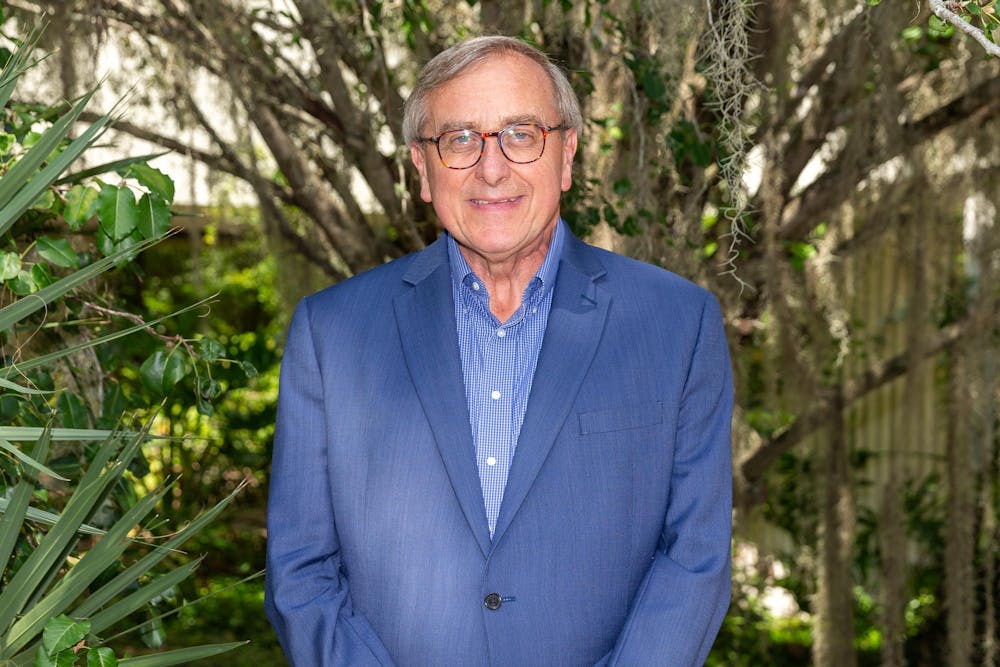Former UF President Kent Fuchs was repairing wall cladding and fixing the plumbing system on his farm in Finger Lakes, New York when he received an unexpected phone call this summer.
Morteza “Mori” Hosseini, the chairman of UF’s Board of Trustees, who Fuchs hadn’t heard from in the 17 months since leaving office, said then-UF President Ben Sasse might resign. Would Fuchs be willing to return to the Gator Nation as interim president?
Shortly after Sasse publicly resigned July 18, citing his wife’s declining health, the university announced Fuchs would step in. As the administration prepares for a new and unexpected presidential search, Fuchs is cementing his legacy before he retires from UF for good.
“I've told the Trustees I really want to retire in a year,” Fuchs said. “It's wonderful to be president. It's a great job, [and] I love it, but I'm 70 this year, and I need to retire.”
Fuchs served as UF's 12th president from 2015 to 2023. After leaving the presidency, he refreshed his knowledge of electrical engineering and taught Introduction to Electrical Engineering in Spring 2024, his first time instructing a course since 1996. Returning to his roots as a faculty member, Fuchs disconnected from the university’s administrative affairs.
“I worked really hard to be what I think is a good former president,” Fuchs said. “That is to not engage with the university administration, not to take interviews with anybody about anything, and try not to even pay attention [to university administration] and just focus on my work.”
The presidential search begins with the Board of Trustees, which is responsible for appointing a search committee. Once established, the search committee selects a search firm, which it works side-by-side with to find potential candidates.
After consulting with hundreds of people, gathering suggestions and collecting ideas, the search committee interviews 10 to 20 candidates and narrows the selection down to a few finalists.
“I am thrilled that Kent has agreed to take on this important role at such a critical time to ensure a smooth and orderly transition as we prepare to initiate a national presidential search,” Hosseini said in a university-wide email July 23. “We owe him a huge debt of gratitude.”
Hans van Oostrom, the Founding Chair and Associate Professor of the UF Department of Engineering Education, posted a selfie with Fuchs Aug. 9 and captioned it, “Great to serve with [UF] president Fuchs again.”
Previous, current and future university presidents rarely interact, Fuchs said. However, he praised the progress Sasse made during his 18 months in office, like the expansion of the Hamilton Center and the establishment of the Honors Village.
Fuchs is familiarizing himself with Sasse’s roughly 100 presidential initiatives and handpicking the ones he wants to pursue during his short time in office.
Fuchs has already decided to emphasize the growth and resource development of UF’s Jacksonville campus, but he has opted not to launch K-12 charter schools around the state, which Sasse championed. The idea diverges from UF’s core mission of educating undergraduate and graduate students, Fuchs said.
Fuchs said his goals for the university are different from Sasse’s, who prioritized the transformation of higher education through the creation of new facilities and programs.
National rankings are important to Fuchs, who said they increase international visibility. Sasse, meanwhile, believed rankings, such as those from the U.S. News and World Report, to be arbitrary measures of a university’s status.
“I’m not saying it’s better,” Fuchs said of his plans. “It’s who I am, so that’s my focus.”
The Alligator reported in August that Sasse more than tripled his office’s spending compared to Fuchs’. Fuchs said he wasn’t even aware of his own spending until The Alligator report came out. He assumes Sasse's vision for the university necessitated a different budget and added the Board of Trustees is heavily involved in audits and budgets and closely monitors the president’s spending.
“I really can't speak to his expenditures,” Fuchs said. “He had a different vision that I'm sure required an investment. I just have a different style.”
Fuchs said he made it clear that he wants to retire by Summer 2025. Meanwhile, the next private presidential search is in its beginning stages. Fuchs expects a candidate to be chosen by mid-2025.
While Fuchs sees himself as more of a figurehead during this transitional period, he doesn’t believe the future of the university is solely dependent on who’s president.
“It’s really about the university — its history, its future and all the amazing people that are here and those that have graduated,” Fuchs said. “We’re the University of Florida, and we’re all here to make the place better.”
Contact Annie Wang at awang@alligator.org. Follow her on X @wynwg.
Annie Wang is a metro general assignment reporter and a second-year journalism major. She has previously worked on the university desk as the university administration reporter. She enjoys reading and writing book reviews in her spare time.






